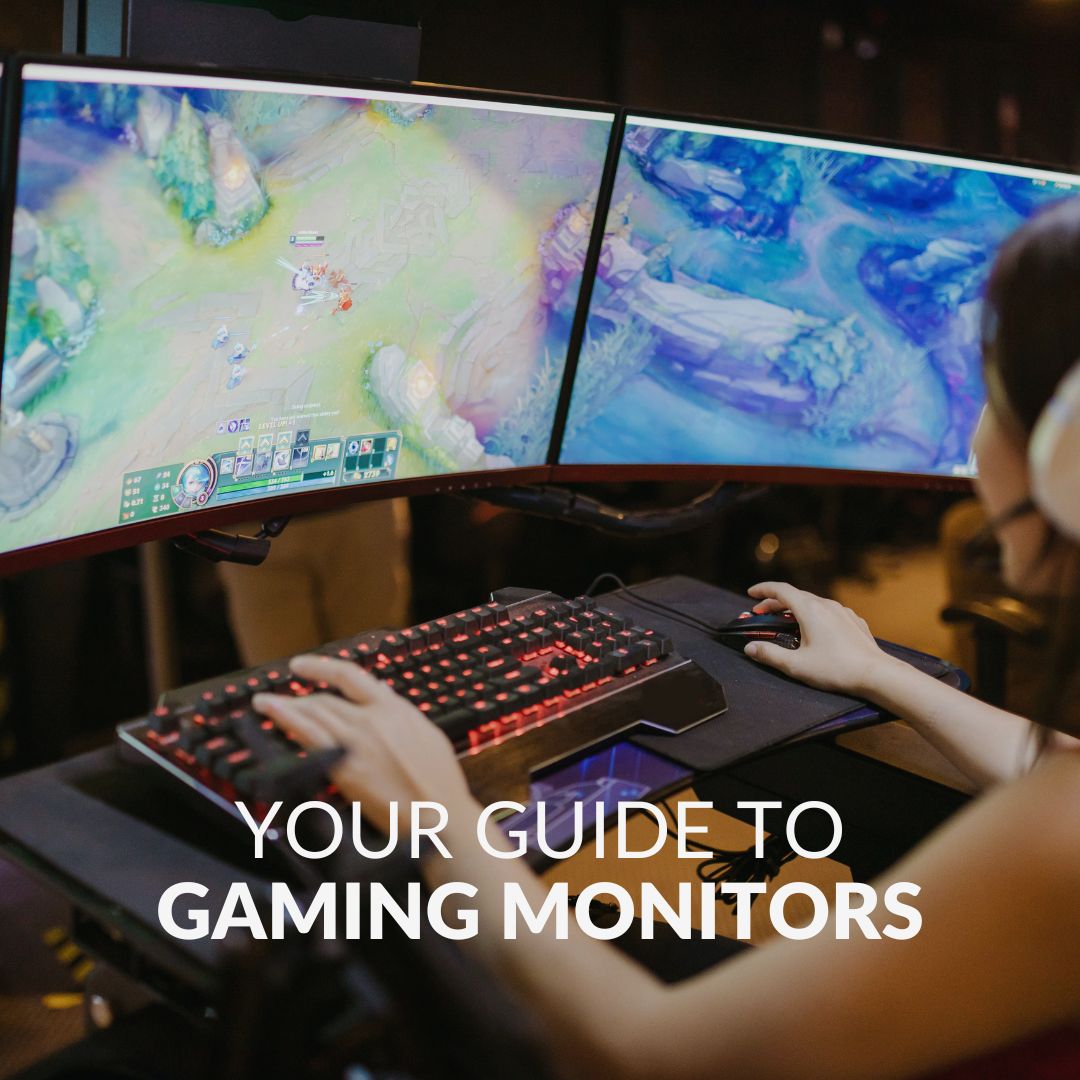We all know that a key component for your gaming experience is your gaming monitor.

It’s all well and good having the latest NVIDIA or AMD graphics card, but if your monitor is from the dark ages then what is the point? Here to shed a little light, we’ve put together a comparison of three gaming monitor types, to go over the important stuff. Why? To make it easier for you to upgrade your monitor and enjoy gaming the way the studio intended.
Option One – Widescreen Gaming Monitor
The most common monitors nowadays are widescreen, with a 16:9 aspect ratio. The aspect ratio denotes how the image fills the screen. For quite some time now, widescreen has been the standard, replacing 4:3. Does anyone else remember having to manually change the aspect ratio from 4:3 to 16:9? Or is it just me who’s old? Regardless, this format has fantastic compatibility with games, old and new. Plus, being the standard, there is an incredible range of monitors available, in a variety of sizes, styles, and resolutions.

LG
1920 x 1080 IPS @ 144Hz

AOC
1920 x 1080 IPS @ 144Hz

BenQ Zowie
1920 x 1080 TN @ 144Hz
Widescreen Monitors
Medium-sized widescreen gaming monitors are popular among esport professionals. Plus, they have blindingly fast refresh rates for the smoothest gaming experience. You can truly achieve a competitive edge with widescreen monitors.
When it comes to console gaming, the widescreen is definitely the solid choice. Neither PlayStation nor Xbox consoles natively support wider ratios. No one wants to start their gaming session fiddling about with remotes and settings. With next-gen consoles, like the PS5 and Xbox Series X/S, you are best opting for a 4K monitor featuring an HDMI 2.1 connector. Next-gen consoles deserve next-gen graphics.
Depending on your preferred gameplay style will influence what resolution you opt for. Full HD, 1920 x 1080 pixels, is fantastic for competitive play, thanks to the high refresh rates and clear images. For something a little more cinematic, bumping up to 4K or Ultra-HD, 3840 x 2160 pixels, will take your gameplay from beautiful to mind-blowing.
Our Top Pick: ASUS 24″ TUF Gaming VG249QM1A Widescreen Gaming Monitor
Here at Overclockers UK, we stock a great range of widescreen monitors. Any one of them is going to offer high refresh rates, amazing resolution, and compatibility with the latest graphics card technology. My particular favourite is the Asus TUF Gaming VG249QM1A, for its bold look and 1ms response time.

Asus TUF Gaming VG247Q1A
| Specification |
|---|
| 1920 x 1080 display resolution |
| 24″ display size |
| 240Hz refresh rate |
| FreeSync Premium/G-Sync |
| 1ms response time |
| 3500:1 contrast ratio |
| Panel: IPS |
Option Two: Ultrawide Gaming Monitor
Moving up from 16:9, Ultrawide monitors use a 21:9 aspect ratio, a juicy 33% wider. This offers more horizontal image range, quite often utilising curved screens, adapting to a more natural viewing angle. As well as amazing resolution, this grants the key benefit of reduced eye strain. Plus, with a gentle curve, the peripheral images are going to be brought closer in your line of sight, for an incredibly immersive experience.

LG
2560 x 1440 IPS @ 144Hz

Asus ROG
2560 x 1440 IPS @ 240Hz

BenQ
2560 x 1440 IPS @ 144Hz
Ultrawide Monitors
Having an ultrawide monitor is going to enhance your gaming experience, drawing you further into the heart of the world you’re playing. Plus, the information displays, such as mini maps and quests, will move further from the centre of the action. Meaning you have a better, uninterrupted visual experience. For games like Microsoft Flight Simulator 2020, having the HUD out of the action is going to leave you with breathtaking views. One thing to note, though, is that as this is a larger aspect ratio, you will need about 20-30% more performance from your graphics card – make sure this hardware is properly cooled!
Whilst this is an incredible platform for cinematic, single-player games, some of the more competitive, multiplayer titles suffer in ultrawide. Certain games just don’t support the ratio natively. Some publishers see the extra field of vision as an unfair advantage. The ways around this are artificially zooming your image in to meet the edges of your screen, or play with black bars at the edge – akin to watching 4:3 on a 16:9 screen.
Of course, not all publishers take issue with the wider screen as the majority of gaming action takes place in the centre of the screen. Therefore, these extended peripherals do not necessarily grant any sort of advantage.
Our Top Pick: Gigabyte 27″ G27QC A Ultrawide Gaming Monitor
The range of curved, ultrawide monitors at Overclockers UK is jam-packed with models that boasts G-Sync, Free-Sync, and other hardware to facilitate the smoothest gaming. With popular brands such as LG, Samsung, and MSI, you’re sure to find a curved monitor that meets your needs. My particular favourite is the Gigabyte G27QC A-EK.
Gigabyte G27QC A-EK
| Specification |
|---|
| 2560 x 1440 display resolution |
| 27″ display size |
| 165Hz refresh rate |
| FreeSync and G-Sync compatible |
| 1ms response time |
| 3000:1 contrast ratio |
| Panel: VA |

Option 3: Superwide Gaming Monitor
If you thought nothing could top ultrawide, then prepare yourself for Superwide, utilising an aspect ratio of 32:9. Effectively, it functions like two 16:9 wide screens sat side by side, making these monitors an absolute dream for multitasking. As such, it negates the need for having multiple monitors, if that just really isn’t your style. What’s more, these superwide monitors are phenomenal to game on – providing your PC’s hardware is up to the task.

Gigabyte
5120 x 1440 OLED @ 144Hz

LG
5120 x 1440 VA @ 200Hz

iiyama
5120 x 1440 VA @ 165Hz
Superwide Monitors
With a monitor of this size and aspect ratio, you can say goodbye to split-screen multitasking on halved windows. You can deploy your needed applications and browsers to their full width, side by side without compromise. This is supported with picture-by-picture software, letting you display two sources at once.
Gaming on a superwide monitor is going to envelop you in your digital world. For simulation games in particular, you can be fully immersed as your entire field of vision is filled with this incredible display. It is recommended that your favourite games do support the 32:9 aspect ratio, though. Alternatively, you can game at 16:9 and enjoy your favourite stream at the same time, without any monitor frames breaking up the display. You have a superwide canvas to play with, after all.
Our Top Pick: Samsung Odyssey OLED G9 49” Superwide Gaming Monitor
Superwide monitors are growing in availability and popularity. Featuring both curved and flat superwide monitors, the range at Overclockers UK covers a variety of styles and sizes to fit your needs. But the stand out model has to be the Samsung Odyssey G9.

Samsung Odyssey OLED G9
| Specification |
|---|
| 5120 x 1440 display resolution |
| 49″ display size |
| 240Hz refresh rate |
| FreeSync compatible |
| 0.03ms response time |
| 4000:1 contrast ratio |
| Panel: OLED |
What Conclusion Can We Draw?
As with any big purchase and hobby investment, a large part of your decision is going to come down to what you need the product for. I can talk until the cows come home about how great each of the various styles are, but what are they best for?
If you’re new to gaming, still exploring what genres and gameplay styles you like whilst upgrading your hardware, then absolutely go for the 16:9 widescreen standards. There’s no messing around with ratio settings as these monitors are already primed for your next favourite game, and they have the greatest product availability.
For those who demand more immersion and an amazing field of view, then the ultrawide is your best option. Whether you opt for flat or curved, the ultrawide is going to provide the best cinematic gameplay for you to lose yourself in.
Lastly, the superwide may seem opulent, but it is a fantastic aspect ratio for content creators, multitaskers, and those who just can’t get on with having more than one screen. (Hands up if you’re constantly losing the cursor like I am.)

Gaming Monitors
At Overclockers UK, we have an extensive range of gaming monitors from big name brands. If our top picks in this article didn’t float your boat, then you can explore our full collection with just the click of a button.



